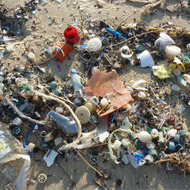Think tank warns government not to rush plastic decisions

The Green Alliance warns that replacing plastics with plant-based materials could increase pressure for deforestation.
The wave of concern over plastic waste could be more damaging than it seems, according to independent think tank, the Green Alliance.
Speaking to BBC News, The Green Alliance’s Libby Peake said: "Plastics are clearly a huge problem but we have concerns that legitimate public outrage will lead businesses and governments to rush into the wrong decisions. We must ensure that whatever solutions we design don't increase emissions, damage world ecosystems or result in more waste."
Her commons follow a call for evidence by Chancellor Phillip Hammond on taxes on single-use plastic. He said that taxes would increase the cost of new plastic and make it attractive to recycle or switch to alternative products like wood.
Responding, the Green Alliance warned that replacing plastics with plant-based materials could increase the pressure for deforestation and, in turn, lead to an increase in greenhouse gas emissions.
Earlier this month, Danish toymaker Lego announced that it’s bushes, trees and leaves would soon be made with plastic sourced from sugarcane. The move followed public outcry against plastics and forms part of the company’s promise to use sustainable materials in products by 2030.
Ms Peake told BBC News: "Turning plants into plastic in this way means that, at the end of life, it won't be biodegradable and will have all the potential drawbacks of traditional plastic. In other words, it won't do anything to solve the crisis of marine pollution.”
The Green Alliance has proposed a series of alternatives, including a ban on products that are unnecessarily made from plastic, such as straw and cotton buds. They have also called for a stop on using so many different types of plastic and to ensure that all types are easy to recycle.



 The Veterinary Medicines Directorate (VMD) is inviting applications from veterinary students to attend a one-week extramural studies (EMS) placement in July 2026.
The Veterinary Medicines Directorate (VMD) is inviting applications from veterinary students to attend a one-week extramural studies (EMS) placement in July 2026.